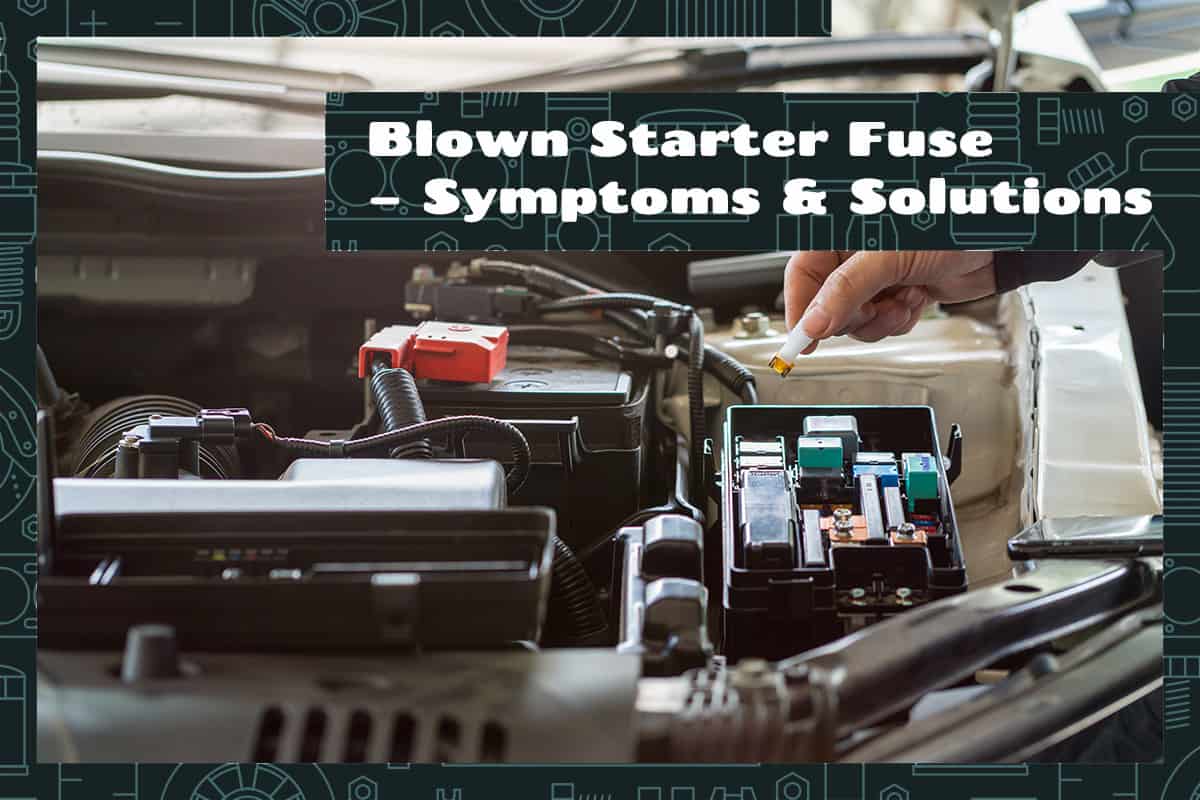Every vehicle relies on a myriad of components to start and run smoothly. One such component, is the starter fuse, which acts as a safeguard to keeps electrical currents at safe levels. A blown starter fuse, though small, can lead to all sorts of worrisome issues.
When a starter fuse is blown, the car may fail to start, show intermittent starting issues, or certain dashboard lights might not function. Repair options include replacing the fuse and addressing underlying causes, sometimes necessitating professional help.
In this guide, we’ll explore symptoms, causes, and solutions related to a blown starter fuse in more detail.
The Role of the Starter Fuse
The starter fuse, much like a gatekeeper, monitors and controls the flow of electrical current to the starter motor. This ensures that the motor receives just the right amount of power to crank the engine without being overwhelmed by excess current.
Function of the Starter Fuse
The primary function of the starter fuse is protection. It’s designed to be the weakest link in the electrical chain, so when there’s an overload or surge in current, the fuse sacrifices itself, blowing or breaking its internal connection. This action stops the flow of electricity, preventing potential damage to the starter motor or other electronic components.
Working with Other Components
The starter fuse doesn’t work in isolation; it’s part of a broader system. When you turn the ignition key or push the start button, electricity from the battery flows towards the starter motor. The fuse ensures this path is safe. If there’s any irregularity in current, it intervenes, ceasing power flow.
After the fuse, the current reaches the starter relay, another protective device, which then directs the electricity to the starter motor. When all components are in sync, the engine cranks up seamlessly.
Common Causes of a Blown Starter Fuse
A blown fuse can be a warning sign of underlying issues, which include:
1. Natural Wear and Tear
Fuses aren’t immune to the inevitable process of wear and tear. Each time a fuse allows current to pass through, it experiences a slight degree of wear. Over countless ignition cycles and years of use, this wear accumulates, weakening the fuse.
2. Electrical Surges
There are instances when these thresholds are unexpectedly exceeded, resulting in what’s known as an electrical surge. Such surges can be triggered by events like jump-starting a car using a higher-voltage battery or a malfunctioning alternator that produces excessive power. When such surges occur, the starter fuse might blow to prevent the overload.
3. Incorrect Fuse Rating or Installation
Using a fuse with an incorrect rating, whether it’s too low or too high, can lead to issues. A lower-rated fuse might blow prematurely even under normal electrical loads, while a higher-rated fuse might not blow when it should. Improper installation can also cause the fuse to sit loosely or have inadequate contact.
4. Short Circuits
A short circuit, in automotive terms, is an unintended connection between two points in an electrical system. This can be due to factors like damaged wiring insulation, allowing wires to touch each other or the vehicle’s frame. When this happens, electricity finds a new, unintended path, often with much lower resistance. The resulting surge of current can quickly overwhelm a starter fuse.
5. Faulty Starter Motor or Relay
The starter motor itself, or its associated relay, can develop faults. The starter motor’s internal components might degrade, or the relay might malfunction. Such malfunctions can lead to situations where the motor draws excessive power, especially during the ignition phase. When this happens, the surge in current can be enough to blow the fuse.
6. Corrosion or Moisture
Corrosion can introduce unpredictability in how electricity flows. Similarly, moisture intrusion, whether from a leak, flood exposure, or high humidity, can bridge electrical connections. Both corrosion and moisture can lead to unexpected electrical paths or resistance changes.
Symptoms of a Blown Starter Fuse
When the starter fuse malfunctions or blows, it often takes form through various symptoms that can impact the vehicle’s operation.
1. Complete No-Start Condition
Perhaps the most obvious sign of a blown starter fuse is when the car fails to start altogether. When the fuse is intact, it allows the current to flow from the battery to the starter motor during ignition. However, if it’s blown, this flow is interrupted. When you turn the key or press the ignition button, you might hear nothing, or just a series of clicks, but the engine won’t crank.
2. Intermittent Starting Issues
In some cases, before a starter fuse completely blows, it might be on its last legs, causing intermittent starting problems. This means that sometimes the car starts without a hitch, while other times it refuses or struggles.
3. Certain Dashboard Lights Not Illuminating
The starter fuse doesn’t just influence the starter motor. It can also impact other circuits related to the ignition process. If you notice specific dashboard lights not coming on when trying to start the car, especially those related to the battery or ignition, it could indicate a fuse issue.
4. Visible Fuse Damage
While this symptom requires a direct check, it’s a definitive way to identify a blown fuse. By accessing the fuse box and locating the starter fuse, drivers can often see a broken filament or blackened glass inside the fuse. Some might even display clear signs of melting or burning due to the electrical overload.
5. Battery Issues Not Apparent
If a car refuses to start but shows no sign of a weak or dead battery (lights are bright, radio and other electronics work), it shifts the focus towards other potential causes, with the starter fuse being a primary suspect.
Solutions for a Blown Starter Fuse

If you suspect your car’s starter fuse is malfunctioning or blown completely, you can get your car back on the road by implementing any of the following solutions:
Inspect and Replace the Fuse
This is the most straightforward solution. Once you’ve identified a blown fuse:
- Locate the Fuse Box: Typically found under the dashboard or in the engine bay, consult the vehicle’s manual if unsure of its location.
- Identify the Blown Fuse: Look for a broken filament or any signs of melting or discoloration.
- Replace with a Correctly Rated Fuse: Ensure you replace the blown fuse with one that has the exact same amperage rating. Using a differently rated fuse can lead to other complications or another blown fuse.
Check for Underlying Issues
A repeatedly blown fuse often suggests deeper issues. It’s not enough to simply replace it without determining the root cause. Consider:
- Inspecting the Wiring: Look for frayed cables, exposed wires, or any signs of damage around the starter motor and ignition circuit.
- Testing the Starter Motor: Use a multimeter to measure the resistance and ensure it’s working within the correct parameters.
- Checking Other Components: Components like the alternator, battery, and ignition switch can impact the current flowing through the starter fuse.
Consult a Professional
If you’re unsure about the cause or if the problem persists after changing the fuse, it might be time to see an expert. A reliable mechanic will know what signs to look for, what parts to check, and what to replace.
Install a Surge Protector
While more common in home electronics, automotive surge protectors can help shield your vehicle’s electrical system from unexpected spikes in voltage. Though not a common solution, it can be beneficial, especially if your vehicle has faced multiple electrical issues in the past. This should only be done after you’ve resolved the bad starter issue.
FAQs
1. How much does it cost to replace a starter fuse?
Replacing a starter fuse is generally one of the more affordable automotive repairs. The cost can be broken down into two main categories: the price of the fuse itself and the labor charges if you opt for a professional replacement.
The fuse itself is relatively inexpensive. Depending on the make and model of your vehicle, as well as the brand and quality of the fuse, you can expect to pay anywhere from $1 to $15 for a single fuse.
Labor costs vary based on location and the specific repair shop. Generally speaking, you can expect labor charges to range from $20 to $75 for fuse replacement.
2. How long does a typical starter fuse last?
The lifespan of a starter fuse can vary based on several factors. Generally, a starter fuse should last for many years and could even last the entire lifetime of the vehicle without needing replacement. Given ideal conditions and no unexpected electrical events, a starter fuse could very well last 100,000 miles or more.
3. What are the risks of using a fuse with a higher or lower rating than recommended?
Fuses are specifically designed with certain amperage ratings to provide the right amount of electrical protection for different circuits in your vehicle. Using a fuse with a different rating than what’s recommended can pose several risks:
- Using a Lower Rated Fuse: If you replace a starter fuse with one that has a lower amperage rating, it may blow prematurely. This is because it’s not designed to handle the amount of current that the starter circuit requires. As a result, you might find yourself replacing fuses more frequently.
- Using a Higher Rated Fuse: This poses a more severe risk. A fuse with a higher amperage rating will allow more current to flow through the circuit than it’s designed to handle. This can lead to overheating and potential damage to the electrical components in the circuit.






